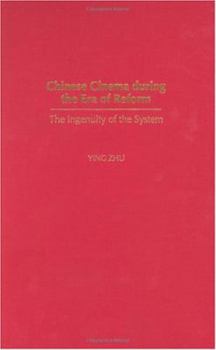Chinese Cinema during the Era of Reform: The Ingenuity of the System
The political economy and culture of Chinese cinema during the era of China's prolonged economic reform has not until now been examined in detail. Ying Zhu's new and comprehensive study examines the institutional as well as the stylistic transitions of Chinese cinema from pedagogy to art to commerce, focusing on the key film reform measures as well as the metamorphosis of Chinese Fifth Generation films from art film narration-as in Chen Kaige's 1984...
Format:Hardcover
Language:English
ISBN:B0079UFL2G
ISBN13:9780275979591
Release Date:August 2003
Publisher:Praeger
Length:248 Pages
Weight:0.04 lbs.
Dimensions:0.9" x 6.4" x 9.6"
Customer Reviews
4 ratings
Glowing review in the Journal of Asian Studies
Published by Thriftbooks.com User , 19 years ago
I came across a glowing review of the book in the Journal of Asian Studies, Nov. 2004, Vol 63, No. 4. Here are a few excerpts-- "Comprehensive in its treatment of the subject matter, the book is well researched, and goes beyond the scholarships of such critics as Chris Berry, Nick Brown, Rey Chow, Shuiqin Cui, Paul Clark, Sheldon Lu, Xudong Zhang, to form a singular critical paradigm of globalization both as restraint and opportunity within which to rethink the Chinese cinema. ... Zhu's analysis of Chinese (national) cinema both as a culture and economy opens important channels of communication between economic reform and cultural production, between popular entertainment and intellectual heritage, between technology and cultural politics, and between local traditions and global markets. ... The reader is fortunate to have a first-hand and intimate account of how cultural, intellectual and political issues are mediated through film to arrive at the state of Chinese cinema as we find it today. The author knows the ins and outs of the collective struggle of the Chinese film community to master the forces of the market in order to stay in business beyond the pale of socialism. ... In Zhu's encyclopedic treatment of the topic, we see a rare synthesis of knowledge and understanding."
Ying Zhu, "Chinese Cinema during the Era of Reform"
Published by Thriftbooks.com User , 21 years ago
Dr. Ying Zhu's book is a wonderful introduction to the post-Maoist Chinese film industry. Useful to both scholars and in classrooms, it presents a picture of a film world that is relatively unknown to most Americans, but may not be for long. Balancing the impact of globalization and Hollywood with national needs, Chinese cinema, like Chinese industry in general, may be the coming wave. This book will give you a head start in understanding why.
great introduction to Chinese cinema
Published by Thriftbooks.com User , 21 years ago
I'll only put a brief word here because Dr. Zhu assigned us to read her new book for our class, so I can't exactly give it a fair review.Although the book has no photographs to see what the films are like (always bad in film books, but sometimes necessary), the book is highly readable and provides a strong overview. A reader could pick it up and have a strong grasp of the history and politics of Chinese cinema. Though her accent can be a bit difficult to understand in class, she is highly readable, well-informed, and did a great deal of first-hand research. If you're interested in Chinese cinema, this is a great starting point. The price and scholarly aim (see design comments below) will not make it stand out on a shelf, if you can find it there.Book design comments: red, gold-stamped, clothbound book, no dust jacket or illustrations, several glaring typos to fix in next edition.
Striking analysis of China's film industry
Published by Thriftbooks.com User , 21 years ago
Zhu's book provides a striking analysis of the Chinese film industry'stransition to a market economy. The book traces the evolution of thefilm industry, and especially the film makers, from making art cinema(as the political atmosphere in post-Mao China relaxed)to needing to respond to the demands of the marketplace, as the policies of the Chinese government shifted to decrease subsidiesfor films and to encourage privatization, marketization, andco-production and co-marketing with overseas film producersand distributors. Key film makers highlighted include Chen Kaige(Yellow Earth and Farewell My Concubine), Tian Zhuangzhuang(Horse Thief and The Blue Kite), and Zhang Yimou (Red Sorghum,Judou, Not One Less). The impact of the re-introduction of blockbusterHollywood films into the Chinese marketplace is scrutinized, both from the perspective of box-office revenue, distribution, and screen time,as well as the perspective of the impact on these films on Chinesefilmgoers and critics taste and expectations of what constitutes a "quality" film.As the Chinese film industry continues its transformation, the bookexplores the impact of Hollywood and globalization on national film industries, raising important questions for all national film industries(not just China) on how they survive and develop a (global) audience.The book explores the exciting possibility of using the cultural advantages of a national film industry to develop a global audience. This book should be of interest to many readers, to students andteachers of Asian studies, Chinese studies, film studies, and of globalizationand economic transformation, of socialist economies into market economies.It will also be of close interest to people in the film industry and in tradejournals as it explores the role and possibilities of national film industriesin the face of a globalized film industry. Film buffs will find much of interesthere in tracing the evolution of various Chinese film directors as they maymore marketable films and found a wider audience.





